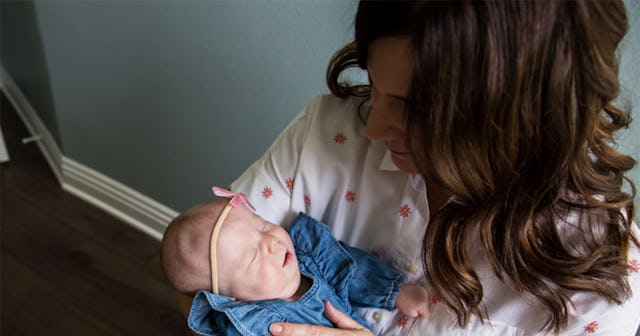My Little Girl Has A Rare Disease––It's A Perpetual State Of Unknowing

The ground wobbles a little when your newborn is diagnosed with a rare disease. It threatens to swallow you whole when you learn a NICU attending has to distribute two stapled pages to each of his staff summarizing your daughter’s condition. They had never before treated a child with Hilde’s diagnosis, let alone heard the name Pallister-Killian mosaic syndrome (a rare condition characterized by weak muscle tone, intellectual disabilities, facial differences, and other health issues).
Initially, I was disoriented in this new world; the ones on whom we rely for their experience and expertise had none. Questions outnumbered answers. This, I’d learn, is a feature of this ground as mom to a child with a rare disease.
The National Institutes for Health estimates that there are 25-30 million Americans impacted by rare diseases. While the number of individuals with Hilde’s particular diagnosis is small, the amount of people dealing with some type of rare disease is not. What’s more, we count ourselves lucky because we do in fact have a diagnosis. Diagnosis can be frustratingly elusive for many battling a rare disease, which may compound an experience already challenging to navigate.
Hilde spent nearly a quarter of her first year hospitalized. There are times on this rare journey when I have thought it will surely break us. I’ve said those frightening words out loud. There are moments the only prayer I can muster through clenched teeth is a staccato Help. Us. Our future has no textbook to follow, no map to guide. How can one survive in a perpetual state of unknowing?
Courtesy of Jennifer Lendvai-Lintner
Eleanor Roosevelt knew. Absently scrolling social media during one of Hilde’s long hospitalizations, I somehow encountered this guidepost. “You have to accept whatever comes and the only important thing is that you meet it with courage and the best you have to give,” she’s quoted.
Acceptance. I’ve found it happens little by little, not all at once. The smallest moves are truly big ones in the end. But make no mistake — I choose to accept. You see, choosing acceptance is my act of courage. Acceptance allows me to soften into our world and into the uncertainty that is part of a journey like this. Uncertainty is part of every path; ours is just made more plain.
On their own, choice and acceptance are a powerful team. But when these two are laced with faith, that’s when mountains move. I accept what is, while moving forward convicted that no matter what comes, this life is good. In fact, that’s a nuance of the word accept. Yes, it means to agree, but it also means to believe in the goodness of something. Even when it is impossibly hard. Even in heartbreak. Even in those moments when I feel utterly lost and broken, when exhaustion is bone-crushing on every level. Even in those dark moments, I believe. Choosing acceptance is how I maintain a pinch grip on this rocky climb. And in this choice, I can meet each moment courageously and with my best.
There are times when my best is fighting big battles for our daughter. Mostly, my best is more simple, but no less spectacular. It’s standing and breathing. It’s loving. It’s a sweet lullaby sung cheek pressed to cheek. It’s the warmest, most tender care that imparts, “You are perfect. You are cherished.” Despite its challenges — maybe because of them — this life is so good.
My courageous best is choosing to remain firmly planted in acceptance, the belief in goodness, no matter what. It’s my solid ground, so I can remain fluid in the storms — resilient.
It’s the only important thing.
It’s the best I have to give.